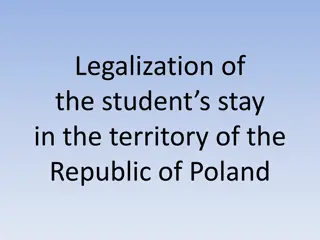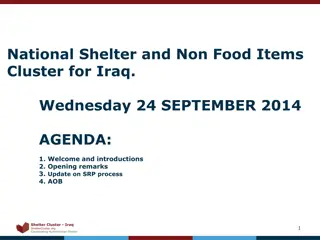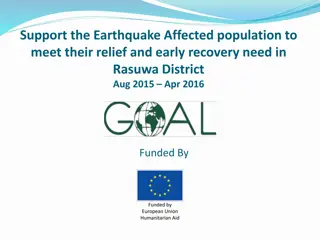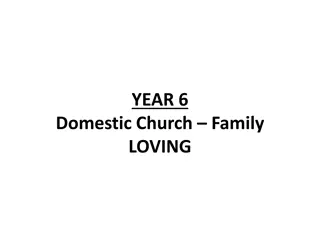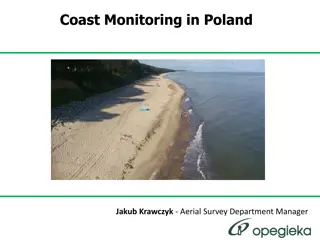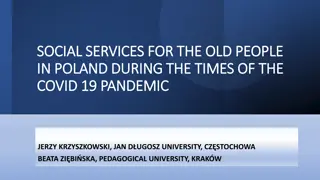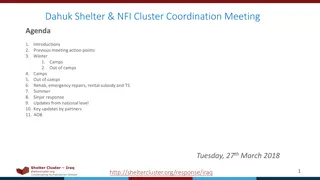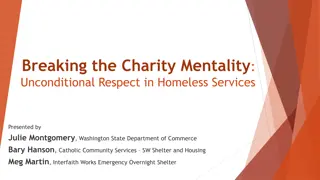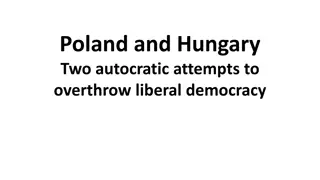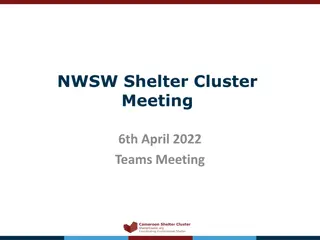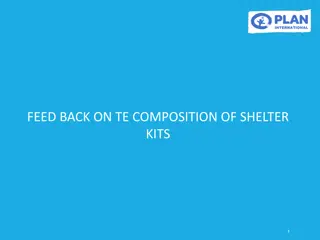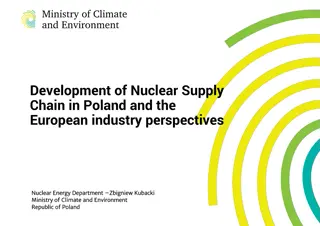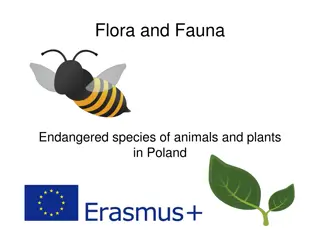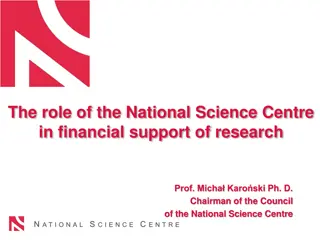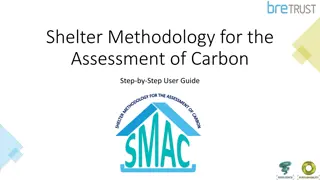Unconditional Right to Shelter in Poland: A Look at Shelter Services and Structures
In Poland, the right to shelter was addressed through an amendment in 2015, focusing on various types of shelter services like warming-up stations, overnight shelters, and hostels. The introduction of an open-door policy for basic services marked a significant change. Different shelter typologies were identified, covering a range of specialized services including those for mothers with children and victims of domestic violence. The structure of shelter services in 2016 showcased the involvement of municipalities and NGOs in providing facilities and beds for those in need.
Download Presentation

Please find below an Image/Link to download the presentation.
The content on the website is provided AS IS for your information and personal use only. It may not be sold, licensed, or shared on other websites without obtaining consent from the author.If you encounter any issues during the download, it is possible that the publisher has removed the file from their server.
You are allowed to download the files provided on this website for personal or commercial use, subject to the condition that they are used lawfully. All files are the property of their respective owners.
The content on the website is provided AS IS for your information and personal use only. It may not be sold, licensed, or shared on other websites without obtaining consent from the author.
E N D
Presentation Transcript
Unconditional Unconditional right to to shelter shelter in Poland right in Poland Jakub Wilczek Jakub Wilczek National Federation Federationfor for Solving Polish PolishNational Solvingthe Problem of the Problem of Homelessness Homelessness
2015 2015 Ammendment Ammendment to Came into power in 2016 Introduced shelter services standards (applicable since 2021) Defined different kinds of shelter services (reinforcing the staircase model) warming-up stations overnight shelters hostels Introduced open door policy (unconditional shelter) but only in basic services Services free of charge in hostels only if social assistance criterion met ( 166/month) Forced closer cooperation between municipalities & NGOs Strict supervision and administrative fines for service providers (up to 5,000) No focus on housing services development to Social Social Assistance Assistance Act Act
Typology Typology of of shelter shelter services services Warming-up station overnight intervention (mostly in winter), up to 25 people in a heated room with seats only, no additional services Overnight shelter overnight intervention (all year), up to 20 people per room in bunkbeds, limited additional services Hostel reintegration (theoretically ), 24 hrs stay, intensive services Hostel with care services (introduced in 2018) for people who are not fully self-reliant due to their age, health or disability; considerably higher standard Other specialised services (mothers with children, crisis intervention, domestic violence victims) available also for people who do not fulfill Polish defininition of homelessness (ETHOS 1, 2, 3.1, 4, 11)
Structure Structure of of shelter shelter services in 2016 services in 2016 Warming-up stations Overnight shelters Hostels Other specialised services Providers Facilities Seats Facilities Beds Facilities Beds Facilities Beds Municipalities 25 499 46 1,322 45 1,874 188 2,204 NGOs commisioned 26 648 54 1,600 167 8,377 53 856 NGOs not commisioned 2 65 16 399 103 4,975 33 770 TOTAL 53 1,212 116 3,321 315 15,226 274 3,830 Source: Ministry of Family, Labour and Social Policy, 2017
Unconditional Unconditional right right to to shelter shelter Art. 48a sect. 8 of Social Assistance Act: Assistance granted in the form of a temporary shelter in a warming-up station or an overnight shelter does not require a social interview procedure, nor an administrative decision, and expenses incurred for the assistance provided are not refundable. Only in low threshold services (ca. 19% of services available): warming-up stations overnight shelters (but ) Access to hostels & specialised services requires: social interview administrative decision signing a social contract local connection or agreement with the municipality of the last registration
But But what what if if a hostel a hostel is is the the only only service? service? The ammendment assumes that a full staircase model works in every municipality Very far from reality Small municipalities with only one service or no service at all Intervention in hostels or reintegration in low threshold institutions Forced to cooperate with other municipalities or NGOs in other municipalities Lots of beaurocratic issues Large municipalities (Warsaw!) with not enough low threshold services Migrating homeless people are being refused services (even if living in Warsaw for several years)
Unconditionality Unconditionality surveyed surveyed Unconditional access to warming- up stations was always natural Most overnight shelters had access conditions before 2016 An online survey was performed in May 2019 49 overnight shelters answered (42.2%) Questions concerned: conditions of access alcohol ban pressure from commisioning municipalities
Open Open access access with with conditions conditions? ? No overnight shelter requires an administrative decision procedure (because that d be directly against Social Assistance Act provisions) but 31 require meeting with an employee before admission 16 require a referral or other document issued by a local municipal social assistance centre ( acknowledgement of homelessness ) 12 require meeting with a municipal social worker before admission 1 requires staying in another shelter before admission (staircase) 6 have other requirements incl. bath, health&disabilities (GP s diagnosis!), local connection, sobriety Only 5 declared that there are absolutely no admission conditions
We do not We do not serve serve People with minors in their custody (26 answers) People with certain disabilities mostly wheelchair users (19) People who do not look homeless or declare they have some place to dwell (18) People who were removed in the past due to their behaviour e.g. punitive temporary ban (18) People with mental disorders (13) People without required paperwork (9) People with last address of registration in another municipality (6) People without ID (4) Only 7 declared that they provide service to anyone in need of shelter
and we and we have have an an alcohol alcohol ban ban Art. 48a sect. 6 of SAA imposes a strict alcohol (and other substances) ban on hostels and overnight shelters Only warming-up stations are allowed to admit intoxicated individuals but there are only 53 of them (2016) with ca. 1,200 seats The ban may be lifted in exceptional cases (e.g. in winter) but there are no procedures defined for lifting the ban the risk is on the provider some shelters declare they cannot lift the ban because it would have a negative impact on other residents who stay sober
So So can can I I use use your your shelter shelter being being drunk drunk? ? No, never (25 answers) Yes, but only in certain weather condidtions (20) Yes, but only if your intoxication is very low (9) Well, kinda we always decide that individually (8) Yes, but we will not let you into a dorm until you re sober (7) Yes, unconditionally 0
Other Other choices choices for for intoxicated intoxicated individuals individuals Sobering-up station in the same municipality (23 answers) Another homeless facility in the same municipality (warming-up station or overnight shelter) (9) Another homeless facility in the same municipality but only in winter (20) Another homeless facility or sobering-up station in other municipality (5) usual solution in small municipalities, known rides up to 150 km (!) Emergency room in a hospital (5) Police custody (14)
People People who who are are not not self self- -reliant reliant Art. 48a sect. 5 of SAA forbids admission of people who due to their age, health or disability are not fully self-reliant into homeless institutions After some pressure from NGOs a new kind of institution was defined in 2018 for this kind of clients hostel with care services The numer of such institutions is still very low (est. ca. 20-25) The admission is restricted similarly to usual homeless hostels Therefore, there are no intervention institutions for this kind of clients The government claims that in intervention cases such clients may be admitted to other kind of institution, but the risk is on the provider
Pressure Pressure from the from the municipalities municipalities The municipalities are not happy about changes introducing open door policy in overnight shelters they are losing control they must pay for services for people from other municipalities The open door policy means that a municipality should pay for overnight shelter s readiness for service, regardless of the numer of service users yet, 15 declared that they are still being paid for each user, 1 respondent declared that their overnight shelter was closed due to the changes, 4 overnight shelters were turned into a hostel with access conditions, 1 declared the numer of beds was halved, 1 declared the opening hours were shortened, 6 declared they feel threatened with closure or turning into a hostel
Conclusions Conclusions Lack of understaning for right to shelter among providers and municipalities It s not easy to give up control Overbeaurocratisation of introduced changes Plus risk on the provider issues & administrative fines Alcohol ban a major problem to be solved Warming-up stations and sobering-up stations are not enough Social centres for intoxicated individuals a good practice from Gda sk replicated in a few other municipalities There is no social permission for wet shelters (also among providers/municipalities) People who are not self-reliant another major issue The network of hostels with care services needs time to grow Is housing (first) the answer?
Thank Thank you for your your attention attention you for jakub.wilczek@bezdomnosc.pl jakub.wilczek@bezdomnosc.pl www.bezdomnosc.pl www.bezdomnosc.pl




